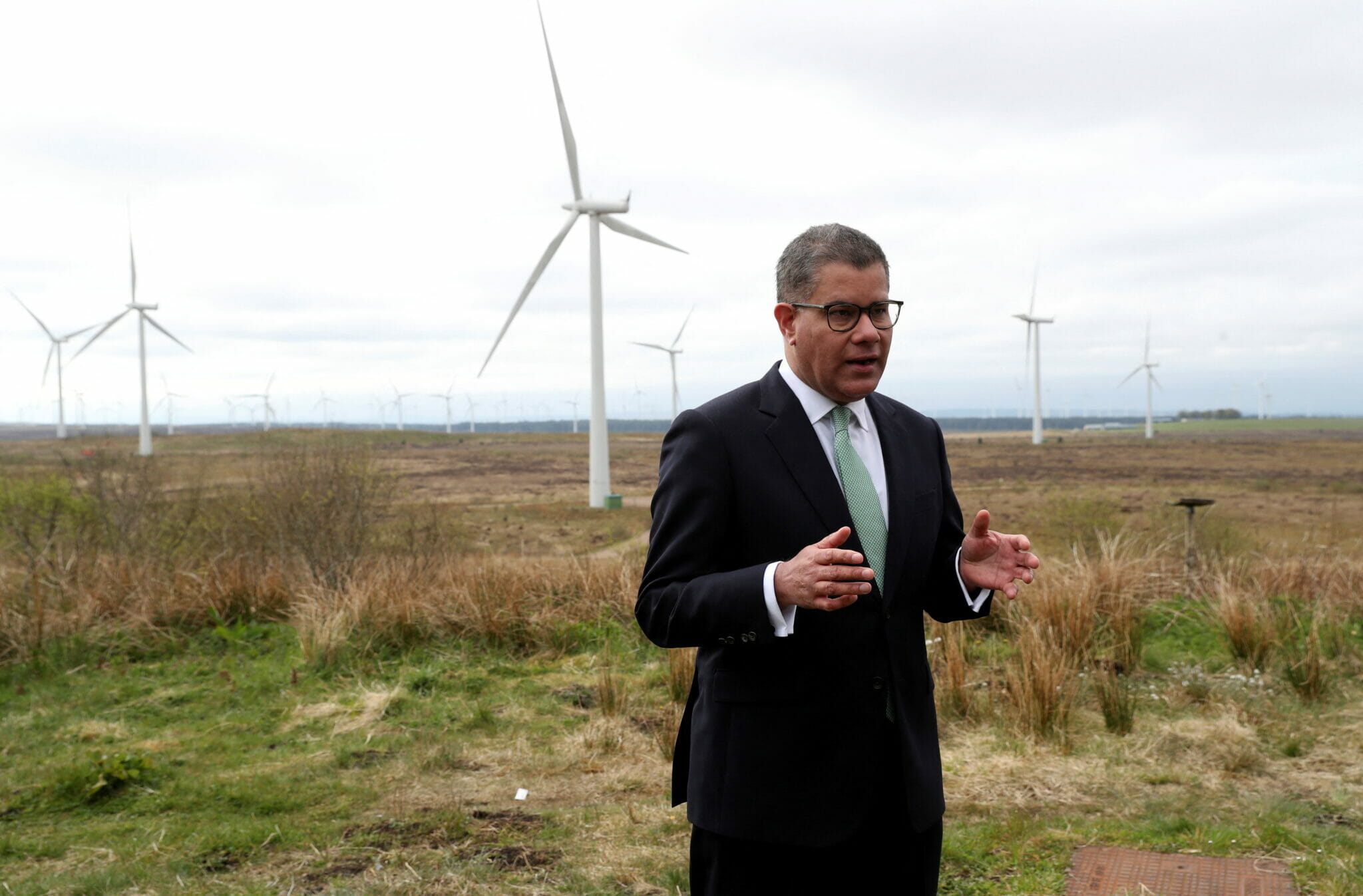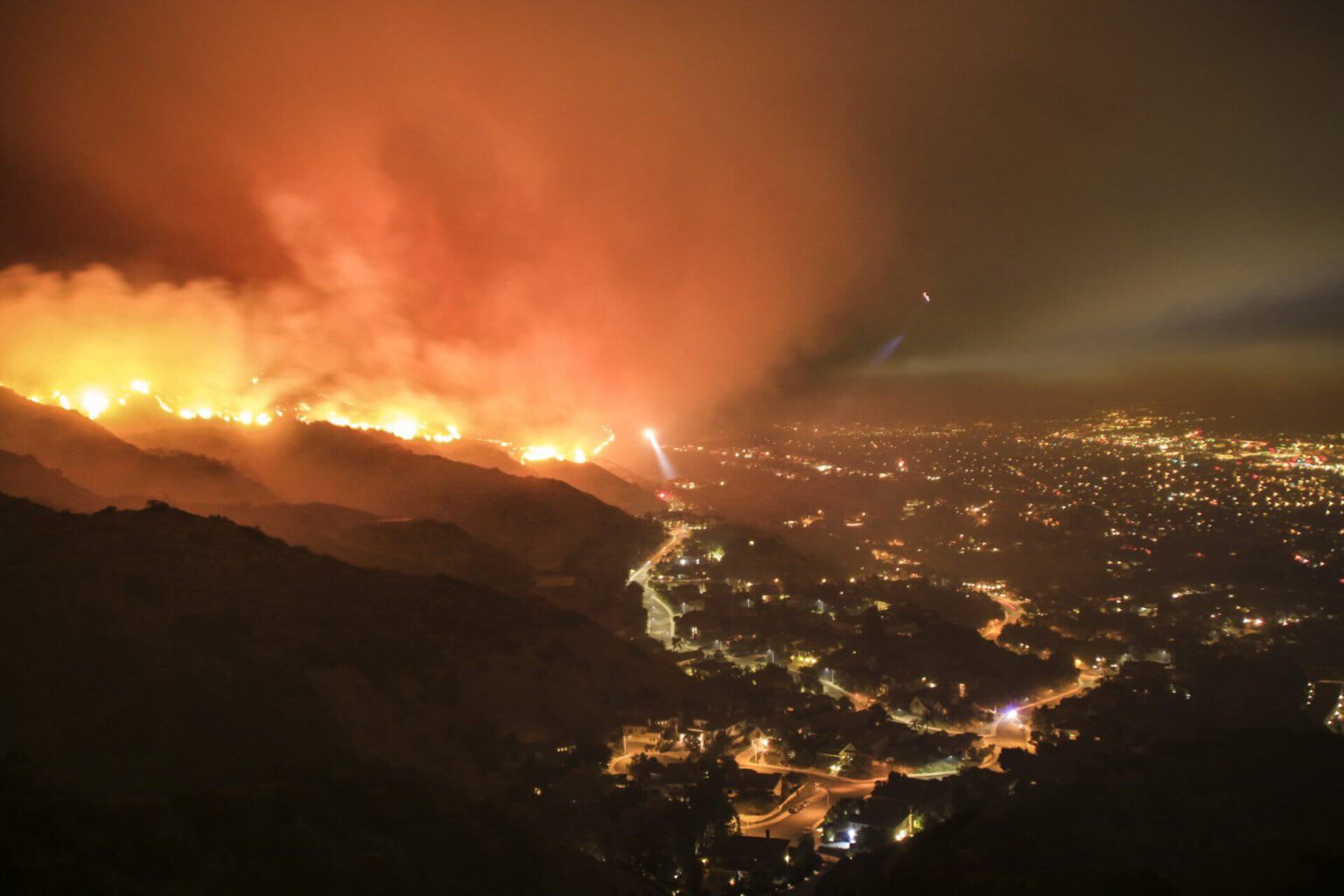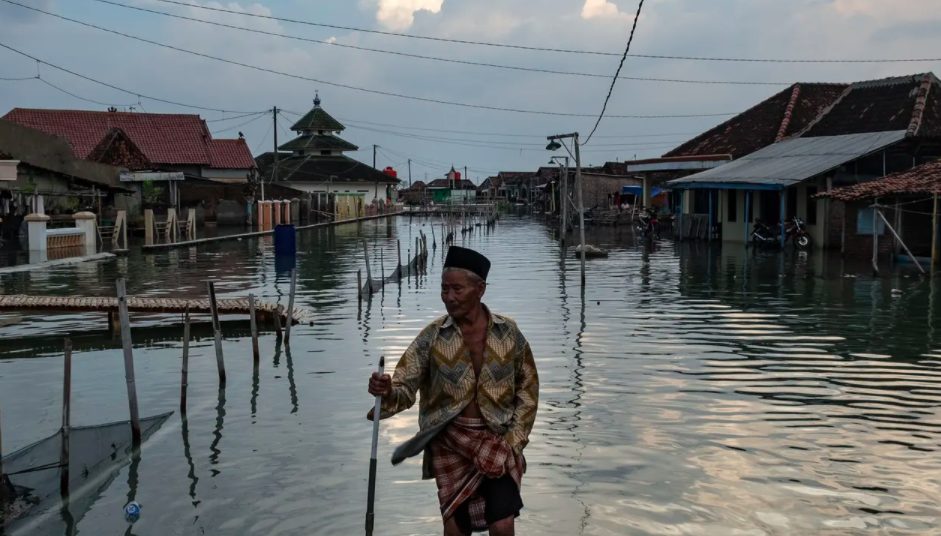Sign up to receive the weekly Climate Beat newsletter.
That headline, from a Reuters story published this week quoting COP26 president Alok Sharma, is one of the great climate headlines of 2021. And it couldn’t be more relevant amid the deadly floods and wildfires ravaging Germany, China, Nigeria, and the American West.
Sharma, the British MP who will lead November’s international climate summit in Glasgow, spoke with Reuters as part of a CCNow-exclusive interview that also included our partners The Times of India and PBS NewsHour. He said that if humanity is to meet the goal of limiting temperature rise to 1.5 degrees Celsius, rich countries have to take the lead. And that’s not only by ending reliance on coal in their own countries (as Britain, notably, has largely accomplished); they must also stop financing coal plants overseas and help make solar and wind financially viable for developing countries. For starters, rich countries can finally begin honoring their Paris Agreement pledge to give poor countries $100 billion a year in climate aid, a figure that Sharma called “totemic.”
The horrific images that have dominated TV news and social media around the world—floodwaters raging through German streets and sweeping away cars in China’s Henan province, all while smoke from wildfires in the American West shrouds New York City 3,000 miles away—reinforce Sharma’s point. The more coal that is burned, the more dire extreme weather like this will get. Remember: we are only at slightly above 1 degree C of global warming, and we don’t have a clear plan yet for stopping the rise. Things can get so much worse. Our stories should say so, from the headline to the kicker.
NEWS FROM US
Stories from the interview with COP 26 president Sharma are available for CCNow partners to republish, including a Reuters news piece (with embeddable video excerpts from the interview, a Times of India news piece and a Q&A, and PBS NewsHour’s video segment, which can be embedded with any of the other stories. Find all of the content in this Google Drive folder…
Tell us your COP26 coverage plans! The November summit is all-important in a “make or break” year for climate action. Over the next few months, there are countless events and meetings with major implications for the outcome of COP26. These events can serve as newspegs for any number of COP26-related features and explainer-style pieces to help your audiences tune in.
Email editors@coveringclimatenow.org to let us know how you’re preparing for COP26. Not sure? Drop us a line, and we’ll be happy to help.
ESSENTIAL CLIMATE COVERAGE
Manchin earns, earth burns. Joe Manchin owns millions of dollars of stock in coal companies, even as he chairs the Senate Energy Committee and wields de facto veto power over climate legislation on Capitol Hill, according to an analysis by Alex Kotch of the investigative outfit Sludge. More from Kotch, for The Guardian…
If Kotch’s findings are accurate, Manchin’s holdings go well beyond the garden variety corruption of politicians receiving campaign contributions from companies affected by their decisions. Campaign contributions go to a politician’s election organization; stock holdings enrich them personally. For the reporters who routinely swarm Manchin, the door is wide open for follow-up questions on these alleged coal stock holdings and why they aren’t a disqualifying conflict of interest.
Dangerous waters. Flooding this week inundated China’s Henan province, submerging streets, trapping people in subway stations in Zhengzhou, and causing one chemical factory, in the city of Dengfeng, to explode. The floods follow severe drought in the region only last week; climate change has made events like these more likely and more severe. From The Washington Post…
And, after floods in West Germany killed close to 200 and injured many hundreds more, leaving wrecked towns in their wake, German chancellor Angela Merkel pledged to redouble efforts in her country to curb climate change. From the Associated Press…
Nigeria has also experienced horrific flooding over the past two weeks, with high water in the country’s northeast and Lagos displacing thousands. (Sadly, you wouldn’t know this from press coverage in the global North.)
Interested in learning more about floods and the climate change connection? Check out this fact sheet from SciLine and Climate Communications. And Columbia University’s Climate School, on Tuesday, hosted a panel discussion featuring journalist Andrew Revkin and several experts talking about floods, heat, and climate solutions.
As extreme weather makes it evermore clear that the climate emergency is here now, CCNow urges fellow journalists to use exactly those words: “climate emergency.” That’s not as a matter of activism but of scientific accuracy. Earlier this year, we and several of our leading partners issued a joint statement calling on journalists to get the climate emergency story right. Read the statement and add your outlet’s signature…
Drought is deadly, too. Climate change is driving a “mega-drought” in the American West that could make cities including Los Angeles, Las Vegas, and Phoenix impossible to sustain, scientists say. Tree rings demonstrate the mega-drought began in 2000, bringing drier conditions than have existed in 1,200 years. From CBS News…
Donations speak louder. With a transition to renewable energy sources underway across the globe, fossil fuel giants are eager to portray themselves as part of the solution. Yet political donations tell a different story, with huge amounts of money still flowing directly from the likes of Shell, ExxonMobil, and BP to the American Petroleum Institute, which lobbies to impede climate action. Part of The Guardian’s ‘Climate Crimes’ series, in collaboration with CCNow, exploring decades of lies by the fossil fuel industry and new efforts to hold them accountable…
Vicious cycle. Poor communities and communities of color generally experience the worst consequences of climate change. And just as these communities often lack resources to adequately prepare for extreme weather, they also lack the resources needed to compete for federal grants and support, leaving them only more vulnerable, as FEMA and other aid groups direct funding elsewhere. From NBC News…
First, not the last. In Louisiana, the Isle de Jean Charles, long home to members of the Biloxi-Chitimacha-Choctaw tribe, has lost 98 percent of its landmass to rising seas since tracking began in 1955—shrinking from 22,000 acres to 320. In 2016, Louisiana received federal funding to help residents of the island relocate, making some community members the first federally-funded climate migrants in the continental US. But those who remain are hesitant to abandon their ancestral home. From Inside Climate News…
Another week, another distraction. Last week, it was Richard Branson. This week, Jeff Bezos took a joyride to the edge of space. And the media took dutiful note! According to a Media Matters analysis, on Tuesday major network morning shows collectively spent 212 minutes on the Bezos flight; compare that with 267 minutes spent on climate change in the entire year of 2020. From Earther…
REPUBLICATION RECOMMENDATIONS
The following stories deserve special consideration for republication by CCNow partners:
- Opinion: The era of loss and damage from climate change is upon us — Saleemul Huq, for Thomson Reuters Foundation
- How a powerful US lobby group helps big oil to block climate — The Guardian
- The Stench of Climate Change — Capital & Main
For partner outlets: to submit stories for sharing, please use this form. As always, instructions for republishing and the full list of stories available for republication can be found in our Sharing Library.
ODDS & ENDS
IPCC Working Group I media registration open. From July 26 to August 6, members of Working Group I of the UN’s Intergovernmental Panel on Climate Change will convene virtually to discuss the physical science of climate change and its implications for policymakers around the world. An opening ceremony will be streamed live on July 26, and a press conference announcing details of the Working Group’s conclusions will be held August 9. Learn more and register here…
Note: The registration process for the IPCC events is different from that for COP26, below.
Registration open for COP26. Journalists and other attendees can apply now to attend the COP26 global climate summit in Glasgow, set for October 31 to November 12. Journalists who have not yet been vaccinated against Covid-19, and are not otherwise able to obtain the vaccine, may do so through the UK COP Presidency. Registration information is here, and information on getting the vaccine is here.
Thanks for reading, and see you next time!
If you have any feedback on this newsletter, or know of information that should be included here, shoot us a note at editors@coveringclimatenow.org



